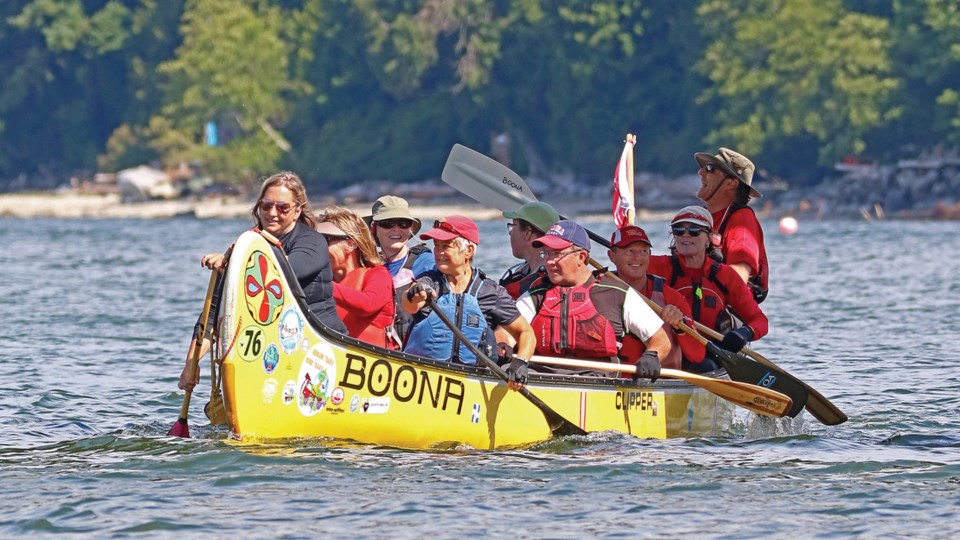Many Hands is a powerful new documentary by Russ Greaves, a filmmaker from Gibsons. It follows the canoe journey of 2017 in which 80 paddlers in nine canoes travelled from Egmont to West Vancouver, traversing the traditional waterways of the shíshálh and skwx wú7mesh (Squamish) peoples. The paddlers slept on the land in Porpoise Bay then portaged across Sechelt’s isthmus to the Strait of Georgia, paddling onward and putting up their tents overnight in the welcoming communities of Roberts Creek and Gibsons.
The reason for the journey was to celebrate Canada’s 150 birthday, but as skipper and journey organizer Ed Hill says at the start of the film, it actually celebrates 150 plus – the plus includes 15,000 previous years of First Nations living on the land we now call Canada.
This film is not a travelogue – it is so much more. Chiaksten (Wes Nahanee) of the Squamish people said it best. “I’m not here to celebrate 150. I’m here to educate.”
At a premiere showing at the Raven’s Cry Theatre on Jan. 28, Kerry Mahlman introduced the film and asked whether the audience knew that some had been uncomfortable with the 150th anniversary concept. She pointed out that millions of dollars were spent on fireworks for Canada’s birthday party, and yet many families in First Nations communities live in poverty without clean drinking water. She suggested we look up our history and the attitudes that prevailed when children were snatched from their parents or when the traditional potlach was banned. Even if we are familiar with these events, she noted, we could all learn more from the film about the journey of the first peoples to revive their own culture.
Some of the most positive and moving accounts came from Terry Aleck (Coyote) who spoke from the heart about his experiences as a residential school survivor, and from Andy Johnson, cultural ambassador for the shíshálh who opened the screening with a song and drumming.
This is a film of balanced reporting. The film gives both heritages, Indigenous and European settlers alike, a chance to speak. They told their history through the voices of those at tems swiya museum on shíshálh land and of those who know modern history from the Sunshine Coast Museum.
The cultural roots are returning, Aleck said. Candace Campo echoed his thought and described the Night at the Longhouse events that were open to all and where the youth of the shíshálh demonstrated their heritage.
The film’s cinematography is excellent. Along with scenes of the actual journey are vivid shots of nature: a foxglove dripping dew, a curious owl, an ambling deer. Xwu’p’a’lich (Barb Higgins) is a “rememberer” for her people, a historian and storyteller. In the film she describes her own visit to the hills that are covered in “standing people” (the trees) and how in nature she can feel the spirit of her ancestors.
The film features many local residents – from those who are members of the Gibsons Paddle Club, sponsors for the showing, to the videographers and editors from Coast TV.
It will be shown again at the Raven’s Cry Theatre in Sechelt, on Feb. 4 at 2 p.m. presented by Gibsons Paddle Club, Coast TV, Shaw TV and Moving Hands Pictures. Admission is by donation.



